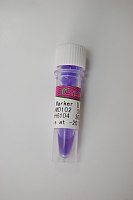Gene targeting by homologous recombination in mammalian cells is an important tool for generating genetically modified mice used for modeling human diseases. Gene targeting approaches are also useful for studying the mechanisms of homologous recombination. We have developed gene targeting methods that we have specifically used to investigate the mechanisms of recombination in cultured mammalian cells. In this chapter, we describe the generation of Chinese hamster ovary (CHO) cell gene disruption (“knockout”) mutants in the repair/recombination gene ERCC1 . Using this approach, we have constructed pairs of isogenic ERCC1 -proficient and -deficient (null) CHO cell lines and used them as recipients for gene targeting assays in which a hemizygous mutant hamster adenine phosphoribosyltransferase (APRT ) locus is corrected by homologous recombination with plasmid vectors containing hamster APRT DNA sequence homologous to the target gene in each cell line. The configuration of the targeting vector leads to experimental outcomes in which certain classes of APRT recombinants are over- or under-represented depending on the repair gene status of the transfection recipient. We describe methods both for targeted gene knockout of ERCC1 , and for APRT targeted gene correction by homologous recombination, and some of our experimental results using these approaches.






